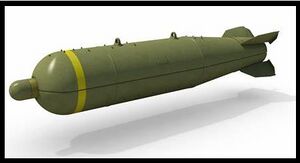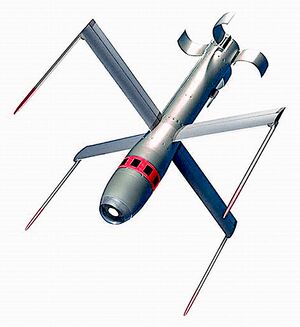CBU-S Torencón: Difference between revisions
old>ContraViper No edit summary |
ContraViper (talk | contribs) |
||
| (2 intermediate revisions by 2 users not shown) | |||
| Line 79: | Line 79: | ||
Conceptualization and development began in 2005 during the [[Inyurstan Intervention in the Lolloh-Ruolnik War|Lolloh-Ruolnik War]], where the [[Inyurstan Army]] utilized anti-tank submunitions fired from {{wp|M270 Multiple Rocket Launch System|M270 MLRS}} against Lolloh deep-column armored formations to great effect. Air Force planners began experimenting with the idea of using BAT munitions deployed from aircraft. | Conceptualization and development began in 2005 during the [[Inyurstan Intervention in the Lolloh-Ruolnik War|Lolloh-Ruolnik War]], where the [[Inyurstan Army]] utilized anti-tank submunitions fired from {{wp|M270 Multiple Rocket Launch System|M270 MLRS}} against Lolloh deep-column armored formations to great effect. Air Force planners began experimenting with the idea of using BAT munitions deployed from aircraft. | ||
Testing of the CBU-S began with the Block II Vampire BAT, an indigenous copy and upgrade of the {{wp|Brilliant Anti-Tank}} Submunition. Due to issues with deployment and targeting reliability, MSDB began production of an improved warhead, the Block III Spectral BAT. Testing found that the new munition had a | Testing of the CBU-S began with the Block II Vampire BAT, an indigenous copy and upgrade of the {{wp|Brilliant Anti-Tank}} Submunition. Due to issues with deployment and targeting reliability, MSDB began production of an improved warhead, the Block III Spectral BAT. Testing found that the new munition had a 95.3% systems reliability paired with a 85.0% accuracy score; resulting in an overall effective reliability of approximately 81% for a single submunition. Tests were performed against both moving vehicles and vehicles at idle, with passive counter-measures such as thermal camo; but not active counter-measures such as smoke or APS. | ||
==Capabilities== | ==Capabilities== | ||
| Line 85: | Line 85: | ||
Part of the "brilliance" of the BAT Submunition is its ability to specifically target vulnerable parts of a vehicle, such as the top or rear of a tank. A lightweight Tandem-HEAT warhead allows such a small munition to puncture a wide degree of armor, including ERA or exceptionally thick passive armor. These attributes make the Block III Spectral BAT extremely effective at destroying or neutralizing modern main battle tanks. | Part of the "brilliance" of the BAT Submunition is its ability to specifically target vulnerable parts of a vehicle, such as the top or rear of a tank. A lightweight Tandem-HEAT warhead allows such a small munition to puncture a wide degree of armor, including ERA or exceptionally thick passive armor. These attributes make the Block III Spectral BAT extremely effective at destroying or neutralizing modern main battle tanks. | ||
The size of the CBU-S makes it ideal for use by faster multirole and strike fighters such as the F- | The size of the CBU-S makes it ideal for use by faster multirole and strike fighters such as the {{wp|Northrop F-20 Tigershark|AC/A-83 Bocaracá}} or the [[Amérifighter EF-20|AC/A-20 Crotaléa]]. A single fighter with just two bombs can expect to engage more than or just as many enemy tanks as they would with a full load out of specialized air-to-ground missiles, while still leaving room for other weaponry such as air-to-air missiles, ARM's, support equipment, etc. This also allows such fighters to fly in and drop their load in a single pass rather than attempt to loiter or come back for multiple attack runs as may be required by multiple missiles. | ||
[[Category:Inyurstan Military Equipment]] | [[Category:Inyurstan Military Equipment]] | ||
Latest revision as of 16:54, 13 April 2022
| CBU-S | |
|---|---|
CBU-S Bomb | |
| Type | Smart Cluster Bomb |
| Place of origin | |
| Service history | |
| Used by | |
| Specifications | |
| Weight | 1000lb |
| Blast yield | 12 Block III Spectral BAT Submunitions |
| Engine | Freefall |
| Flight ceiling |
|
Guidance system | Unguided |
| Block III Spectral BAT | |
|---|---|
| Type | Anti-Tank Submunition |
| Production history | |
| Designer | Morales-Sevalière Design Bureau (MSDB) |
| Specifications | |
| Weight | 20kg |
| Length | 0.9m |
| Diameter | 140mm |
| Warhead | Tandem-HEAT |
| Warhead weight | 1.2kg |
| Blast yield | >600mm RHA Penetration |
| Wingspan | 0.9m |
Operational range | 10km Maximum Scatter Distance |
Guidance system | Acoustic targeting with Infrared (IR) & Charge-Coupled Device (CCD) homing |
| Accuracy | <.5m |
The CBU-S is a 1000lb cluster bomb in use with the Inyurstan Air Force. It is part of the CB Bomb Family, and is essentially a CBU-1000 with a modified payload.
This weapon is named for the Torencón Cave System located in the Yllevesa Jungle of southern Topoguya; which is home to a famously large quantity of bats, including the predatory Spectral Bat.
Development
Conceptualization and development began in 2005 during the Lolloh-Ruolnik War, where the Inyurstan Army utilized anti-tank submunitions fired from M270 MLRS against Lolloh deep-column armored formations to great effect. Air Force planners began experimenting with the idea of using BAT munitions deployed from aircraft.
Testing of the CBU-S began with the Block II Vampire BAT, an indigenous copy and upgrade of the Brilliant Anti-Tank Submunition. Due to issues with deployment and targeting reliability, MSDB began production of an improved warhead, the Block III Spectral BAT. Testing found that the new munition had a 95.3% systems reliability paired with a 85.0% accuracy score; resulting in an overall effective reliability of approximately 81% for a single submunition. Tests were performed against both moving vehicles and vehicles at idle, with passive counter-measures such as thermal camo; but not active counter-measures such as smoke or APS.
Capabilities
Part of the "brilliance" of the BAT Submunition is its ability to specifically target vulnerable parts of a vehicle, such as the top or rear of a tank. A lightweight Tandem-HEAT warhead allows such a small munition to puncture a wide degree of armor, including ERA or exceptionally thick passive armor. These attributes make the Block III Spectral BAT extremely effective at destroying or neutralizing modern main battle tanks.
The size of the CBU-S makes it ideal for use by faster multirole and strike fighters such as the AC/A-83 Bocaracá or the AC/A-20 Crotaléa. A single fighter with just two bombs can expect to engage more than or just as many enemy tanks as they would with a full load out of specialized air-to-ground missiles, while still leaving room for other weaponry such as air-to-air missiles, ARM's, support equipment, etc. This also allows such fighters to fly in and drop their load in a single pass rather than attempt to loiter or come back for multiple attack runs as may be required by multiple missiles.

